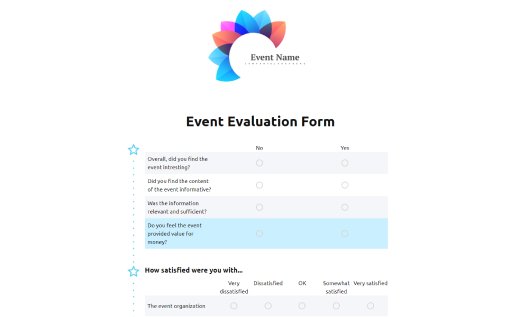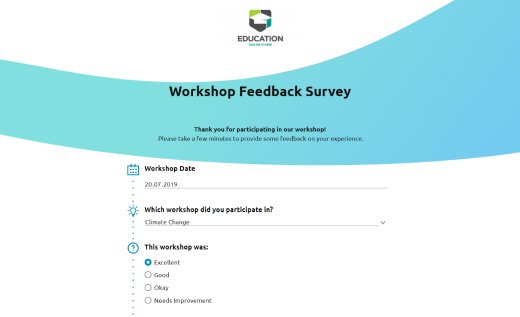Event Evaluation: Purpose, Tips, & Post Event Survey Questions to Ask

What is a Post Event Evaluation, and What is Its Purpose?
At some point, every business or organization will host an event. Whether you are holding a small meeting with stakeholders or customers, or you are hosting an arena-sized annual conference, events are still the primary way that businesses can reach a captive audience. However, how do you know if your event is actually successful? While everyone loves a crowd, simply counting the bodies in the room may not be the best way to measure the effectiveness of an event. You may be better served by asking direct post event evaluation questions.
One of the most efficient and successful ways to gain insight into how well an event has performed is with a post-event survey . By crafting an insightful survey that is easy for attendees to complete quickly, participants can give you and your team valuable feedback that will serve two purposes: help you know how to plan better for your next event and generate more loyalty with participants as they are allowed to play a part in the process.
In this article, we will take a look at how to craft and execute after event survey questions, as well as list some tips and tricks to help you and your team create a post-event survey that people actually want to fill out. This article will:
- Look at post-event survey tips and templates
- Discover examples of post-event survey questions
- Learn tips on how to analyze and implement Post-Event Survey Insights
Let’s take a closer look at what a great post-event survey looks like, as well as some tips and tricks for creating a survey that generates quality responses quickly.
May also be interesting: How to Create a Survey Online , Ready-made Survey Templates
Post-Event Survey Tips & Templates
So what are the best event survey questions to ask? Before you begin asking, the first step in creating a post-event survey happens before you even sit down to draw up your form. Before you begin to gather data, you must be crystal-clear on why you want to receive event feedback and what you will do with the data when it arrives. The best way to do this is to develop goals for your specific post-event survey.
The goals you set ahead of time will help you develop your survey to ask the questions you need and gather the answers you want. When developing the goal, ensure that they are specific, time-frame sensitive, and measurable. Consider creating goals around measurables such as:
- Help your brand’s recognition and image among participants, and increase awareness of products or services.
- Create a list of potential prospects and individuals who have shown interest in your company already, and may be interested in attending another event in the future.
- Implement a flow of future communication with participants.
- Provide an opportunity for other companies to present their products and services on terms favourable for you.
Once you have measurable and specific goals set for your post-event survey, it’s time to create the form itself.
A successful event survey is built up of a variety of elements that will determine whether or not someone begins and finishes the survey with measurable responses. Let’s take a look at five tips for building the perfect post-event survey form.
Design With the Event in Mind
Create Questions that are Easy to Answer but Garner Quality Answers
Add a Variety of Response Types
Avoid Asking Leading or Biased Questions
Continue The Relationship
In the event survey itself, make sure to be clear about your desire to continue the relationship with those who complete the form. Consider adding incentives to completion, such as a chance to win a gift card or a discount on your services, products, or future events. Those who take the time to complete a survey are often those who have bought into your brand enough to spend time giving event feedback, so make sure to let them know they are appreciated and that you want the relationship to continue. End your form with a follow-up call to action that encourages them to visit your website or physical location.
Want to see some examples of post event evaluation questions that are ready to be used at the click of a button? AidaForm has a library of pre-built templates that can be customized to fit your specific post-event needs. By creating a free account on AidaForm you can gain access to the entire template library, as well as a full suite of form-building services to help your business gather and use data better. Check out AidaForm’s Event Evaluation Form and Workshop Feedback Survey for more inspiration:
Event Feedback Survey Questions: Examples, Types and Insights
An event feedback survey is only as strong as the questions that make it up. As seen above, by being specific about the goals and format of your survey, you can receive feedback that is helpful and instructive for yourself as well as those completing the survey. Here are some sample survey question to ask after events, as well as examples of each:
Free-Form Responses
The most typical survey question to ask after an event is free-form response. These are usually provided via a text-box with unlimited text entry, allowing survey-takers to respond with as much or little response as they wish.
For free-form answers to gain good feedback, make sure that the questions you ask are specific and pointed. While these questions gain the most qualitative feedback, don’t overwhelm the respondent by making them do too much work to fill out several in one sitting.
- What was your personal favorite or highlight of the event?
- What suggestions would you give to make next year’s event better?
- Can you tell us the most informative speaker or presentation?
- Would you like to offer any ideas for speakers or presentations for next time?
- What was your least favorite element of this event?
- How can we improve this conference or event for you next time?
- Would you like to give any other feedback or insights?
Multiple-Choice Questions
Just like the tests from your school-days, the multiple-choice question set allows you to offer answers for the respondent to choose from. These are great options to include next to free-form or open-ended response questions, as they allow a mental-break for the survey respondent.
When building multiple-choice questions, make sure to avoid being too biased or vague in your response sets. Give the respondent the chance to answer on a scale, and ensure that the answers are clear. You can surely remember those “trick questions” from multiple-choice tests in school - don’t confuse your survey-takers with vague questions or responses. When asked properly, these questions can give you great qualitative and quantitative answers that can be used in the analysis.
- How did you learn about this event?
- Have you attended conferences or events with our company before?
- Which of the following speakers do you remember from the event?
- Which of the following sponsors do you remember from the event?
- Which day/time was the best part of the event?
- Which of the following was the best element of the event?
- Which of the following was the worst element of the event?
- What speaker/sponsor/presentation was your favorite?
- (Include demographic scales as well to gain insights)
Scale-based and Rating-based Questions
Sometimes it is effective to ask questions that simply require a scaled response. These types of questions are great for gaining quick feedback that is easily measurable and qualitative. You have likely filled out many of these types of questions, which ask for a response based on “a scale from X to X”.
Often referred to as a “ Likert scale ”, these kinds of questions are great for gaining a gut-reaction response to a well-worded question set. The responses can be averaged to give you insight into the overall attitude toward a particular element of your event.
- What is the likelihood that you would recommend this event to a friend or coworker?
- How would you rate each speaker or presentation?
- How likely are you to join us in the future for a similar event or conference?
- What would you rate the value of this event for your personal or professional life?
- How did you feel about the event schedule?
- What would you rate the venue and the food options?
Analyzing and Implementing Post-Event Survey Insights
When you have created and implemented your event feedback survey, make sure that you have decided how you will analyze the data that you collect. The data you gain from these after event survey questions will become valuable insights for future events, and should align with the goals you created at the beginning.
The most common measures that companies and organizations love to analyze are the return on investment (ROI) metric and the return on objectives (ROO) metric. Let’s take a look at each in more detail, and how each can help you analyze your feedback survey results:
Return On Investment (ROI)
The first metric to analyze is the ROI of your event based on the responses of your feedback survey. Many of your questions will give you responses that help you analyze ROI - such as questions related to product purchases, attending future events, and the value of the event to respondents. Any question that garners a response that relates to the money, time, and effort put into pulling off the event and the response in revenue is a great measure of ROI.
Return On Objectives (ROO)
The second metric that your survey should help inform is the ROO. These measurables can be found in questions that center on the outcomes of the goals you set for your event. Did new products garner interest and sales? Did your brand’s awareness and reputation grow? Were the speakers, presentations, and the entire event itself successful in the eyes of your respondents? These are all great questions to consider when developing your event feedback survey questions.
As you begin to receive feedback, build a system by which your team can come together and analyze the data and implement a plan to use the answers to make the next event, product, or service better than the last. Also, make sure to let your customers know that their input was vital to the implementation of these new elements, which will build brand loyalty and increase the likelihood of them completing the next survey!
Conclusion
A post-event feedback survey is an invaluable tool for measuring the success and effectiveness of an event of any size. When built with an engaging form creator and sent out to a targeted audience, your company or organization can begin to gather insights that can help you put on better events and conferences that bring in more attendees and increase revenue.
Want to learn more and begin building post-event feedback forms for your own brand? Head over to AidaForm to begin building forms like event evaluation or event feedback surveys and many more. AidaForm has plenty of tips and tricks, including even more examples of the best survey questions to ask after an event.
With a free account, you can begin to build forms and collect data with an all-in-one account that allows you to make informed decisions on effective information. Sign up AidaForm and create better forms today.

